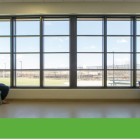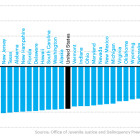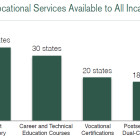
Most States Still House Some Youth in Adult Prisons, Report Says
|
WASHINGTON — Most states continue to house youth in adult prisons, putting them at risk for physical and sexual abuse, says a new report.
Juvenile Justice Information Exchange (https://jjie.org/tag/juvenile-justice/page/16/)

WASHINGTON — Most states continue to house youth in adult prisons, putting them at risk for physical and sexual abuse, says a new report.
States must begin piecing together a strategy to reduce recidivism and improve other outcomes for young adults using a few broad approaches, says a new report from the Justice Center at the Council of State Governments.

Within the world of juvenile justice, law enforcement and corrections officials are re-examining theories and punishments associated with juveniles. This book is a valuable resource for academic courses designed to compare and contrast juvenile justice systems and gain an appreciation of how different cultures approach juvenile justice.

In 2015, California came three steps closer to realizing the founding concepts of the juvenile justice system and securing successful re-entry for justice-involved youth.

It’s been 2½ years since Georgia Gov. Nathan Deal signed a landmark overhaul of Georgia’s juvenile justice system into law. The measure has resulted in a sharp drop in commitments to the state’s youth correctional system and is expected to save tens of millions of dollars by replacing incarceration with community supervision.

“What we’ve got here is failure to communicate.”
The captain, a prison warden, uttered these words in the movie classic “Cool Hand Luke” after beating Luke with a whip for his stubborn disobedience.
These words describe the underlying cause of the South Carolina classroom altercation resulting in the firing of a deputy.

In the 1930s, nine black boys were arrested for a fight on a train in rural Alabama. The assault charges turned into rape when it turned out that two of the hobos were white women who were also riding the rails.

When juvenile justice leaders gathered in Texas earlier this month, policymakers from the Council of State Governments greeted them with some good news and some troubling news.

Our society has become one of exclusion. When people mess up we remove them from their communities in a type of exile. We have done this for more than 40 years with prisons. Everyone from low-level offenders to the most violent criminals have been locked up in amazing numbers for breaking societal rules.

States should do more to ensure quality education for incarcerated youth, says a new report based on a 50-state survey.